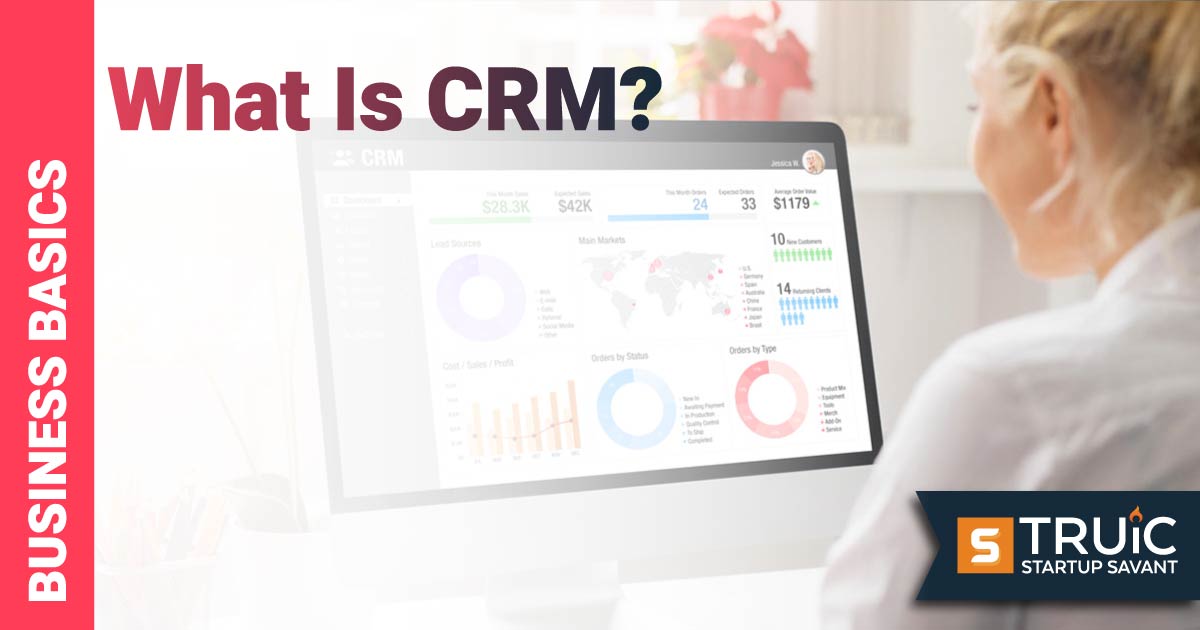Close CRM Review 2024
Is It the Best CRM Software?

Last Updated: By TRUiC Team
Close CRM software focuses on providing tools that drive sales from lead generation to sales funnel reports and pipeline optimization. While it also provides some marketing and customer support tools like email automation and live chat, it really shines when it comes to sales optimization, outreach, and lead management tools.
But before investing in CRM software, you’ll want to make sure you choose the best CRM software for your startup. Read our Close CRM review for a breakdown of the software’s features, pricing, capabilities, and how it matches up to the competition.
Recommended: Check out our review of the best CRM for startups.
Pros and Cons of Close CRM
Close CRM is built to help ramp up sales teams so that they close on more leads, optimize lead generation, and maximize follow-through. It can offer a lot of value with its highest-tiered plans with strong high-volume outreach features, but it does not provide a free option. Users rate it well, but some other comparable CRMs offer more advanced all-around features.
Pros of Close CRM Software
- Strong sales management tools
- User-friendly interface
- Excellent telephony features
Cons of Close CRM Software
- No free option
- Integration limitations
Close CRM Pricing and Features
Startups on a tight budget will be disappointed that Close does not offer a free plan. Paid annual plans start at $25/user/month, with three additional tiered plans increasing in features and pricing. The most popular plan is the Professional plan, with Close’s best savings delivered in its upper-tier plans.
Starter ($25/User/Month)
Notable Features:
- Lead, contact, and opportunity storage
- Built-in global calling
- Pipeline, activity, and opportunity reporting
- Two-way email sync
- Built-in SMS
Basic ($59/User/Month)
Notable Features:
- Call forwarding
- Custom fields
- Sales leaderboard
- Comparison reports
- External phone numbers
Professional ($89/User/Month)
Notable Features:
- Power dialer
- Bulk email sends
- Email and domain filtering
- Call recording
- Email sequences
Business ($129/User/Month)
Notable Features:
- Custom roles and permissions
- Predictive dialer
- Voicemail drop and call transferring
- Custom report graphs
- Built-in call coaching
Close CRM Reviews
We’ve looked at Close CRM software pricing, its strengths and weaknesses, and the top features for different users. But to give you a better sense of whether Close CRM can meet your startup's needs, it's best to hear directly from the customers who use it every day.
Here are some verified reviews from TrustRadius by people who used Close CRM:
“Excellent software to increase sales and follow up with existing and new customers. Email and SMS handling are really easy for the sales team, managing leads is really great, and Close merges duplicate leads to help our Data Leads avoid repetitive and unnecessary calls. As mentioned in some comments before, must improve in reports, Close is not appropriate to handle or track agents' hours making it necessary to implement additional software to cover this area.”
“I was very messy with the need follow up on things and I hardly recalled my prospects, so we've used few other CRMs but we haven't received fruitful results. To be honest, Close has helped a lot in lead management for me and the team as well. Close can be a wonderful tool if it simplifies its platform terminology so it's understandable to every user.”
“Close is my #1 choice for sales teams, both inbound and outbound. The telephony features in Close are exceptional and they lead the Industry in features and innovation. The power dialer increases productivity by cutting down the manual time of physically dialing calls. All calls and interactions including SMS messages are automatically logged to the client's account within the CRM.”
Close was created to help drive sales team improvements and, according to users, it has delivered on that with robust tools to help manage and integrate all telephone, SMS, email, and web-based lead activity. Close leans into these capabilities, offering built-in global calling and SMS with its Starter plan.
Some Close users find that adding app integrations is needed for more advanced functions. For example, while Close includes basic reporting on KPIs, it lacks the built-in advanced analytics and custom reporting functions of more well-rounded CRMs. Still, sales teams at smaller startups will get a capable CRM with Close.
How Does Close CRM Compare?
There are plenty of competitors out there that offer CRM software for startups. One of the more popular is HubSpot. We find that Close compares to HubSpot in the following ways:
Pricing
While there is no free plan, Close offers a 14-day trial. Close’s Starter plan, recommended for small teams, is $25/user/month with an annual contract. Close offers three more tiered plans, with the most popular being the Professional, at $89/user/month, and the most advanced, the Business plan, at $129/user/month. Users opting for the upper-tier plans will find more savings with Close but some lighter features.
Users on a tight budget will like that HubSpot offers an impressive free plan. After that, its Starter plan costs $45/month for 1,000 contacts annually, and its Professional plan with advanced features and phone support costs $800/month. Large organizations can choose the Enterprise plan at $1,600/month for 10,000 contacts. Standard users are free, but to access full functionality, additional users will need to be added for a price, and this can add up.
Features
Close wants to make tracking prospects easy, so it provides all of a contact’s different types of interactions in a single log beside other relevant data. Close's sales dialer, email automation, and video tools will appeal to high-contact sales teams. Top-tier plans allow users to create multiple pipelines for different teams. Users can see the Opportunities View with forecasting details, sales funnel reports, and KPIs. Close offers app integration capabilities, which you’ll need to add some features with HubSpot.
HubSpot provides a robust free plan, including live chat, deal pipeline, contact management, meeting scheduling, email tracking, and marketing capabilities. The paid plans add document management and lead generation features, while advanced plans offer strong customization capabilities and access to automation, workflow, and pipeline tools. Users can create custom objects and reports with top-tier plans and access forecasting and priority support tools. With its free offerings and advanced capabilities, HubSpot takes the lead in features.
Ease of Use
Close CRM software is easy-to-use and intuitive without too many distractions. The onboarding process is relatively straightforward and efficient, and to get started, you'll access a simple process for importing your leads. For those wanting more hand-holding, Close sells onboarding services for a one-time fee ranging from $250 for its Starter plan to $1,500 for its Business plan.
HubSpot also enjoys a reputation as an easy-to–use CRM despite offering advanced capabilities. It has a drag-and-drop editor that makes creating landing pages, forms, and emails simple and a contemporary interface with visible navigation buttons. HubSpot also offers onboarding support with its top-tier plans for an additional fee. Truly, both CRM solutions provide a user-friendly experience, but HubSpot pulls slightly ahead with its advanced offerings and support.
Integrations
Close currently offers 16 native integrations, including popular apps to boost functionality like Zoom, ActionDesk, and Google apps. It also offers over 75 no-code integrations with leading tools, including HubSpot and AllWebLeads. Through Zapier, users have more than 25 additional integration capabilities, including Facebook, MailChimp, Stripe, and Google Sheets. With Close, you will have more limited integration possibilities, but you will be able to add the most important functions.
HubSpot’s App Ecosystem offers many integration options, including over 150 native apps for popular integrations like Google, Facebook, Outlook, Zoom, and Slack. Because native apps are built by and for the platform, they tend to have more functionality and better security than third-party apps, which HubSpot also offers in spades, with over 1,000 available. Because this provides a huge range of choices for customizing your CRM’s capabilities as you scale your startup, HubSpot takes the top spot.
Customization
Close's built-in customization capabilities include custom fields and activities, starting with its mid-tier plan. Custom activities allow users to sync data points from other apps, while custom fields enable users to track lead communication preferences and save prospect info like social profiles. Users can organize teams and communication on top-tier plans by creating unique fields for each department and team. Close also recently announced a feature for creating custom fields for more pipeline clarity.
HubSpot offers customization capabilities with its paid plans, starting with the ability to create custom reports. HubSpot also allows you to create custom objects, so you can categorize your data in unique ways that work for your business. HubSpot recently added the ability to create custom sections within CRM records. Users can also personalize landing pages and website content and add personalization tokens to automated marketing emails. Both offer customization capabilities, with HubSpot offering more advanced options with its premium plans.
Reporting and Analytics
Close provides a quick glance Leaderview with key activity data points and team performance metrics. Its built-in Opportunity Funnel also gathers pipeline performance data. With its focus on sales, it’s no surprise Close emphasizes conversion rates, time to close, and sales velocity in its data points. You’ll be able to drill down on team performance with metrics covering phone time, the distribution of customer data attributes, and performance across your team based on deal value closed. But for advanced reporting features and syncs, you’ll need to add an app integration, like HubSpot.
Naturally, HubSpot comes with more sophisticated built-in reporting features. However, you’ll need a top-tier plan to access the most advanced. But even with HubSpot’s free plan, users will have a visual dashboard of sales activity, productivity, and performance metrics. With paid plans, you’ll have website analytics, campaign, sales, and custom reporting, and with its top plan, multi-touch revenue attribution, and predictive lead scoring. So, when it comes to both free options and robust, built-in reporting capabilities, HubSpot is the winner.
Customer Support
All Close plans come with basic email support and access to a self-service help center that can sometimes be limited. For a more high-touch level of support, users will need the top-tier Business plan, which comes with live screen sharing support, and at six users, a Dedicated Customer Success Manager. While Close CRM software is generally easy-to-use, problems do arise, and some customers report frustration with delays in email service requests. At this time, Close does not provide a live chat option.
HubSpot has been around for some time and so, offers rich self-service options in the form of demos, instructions, and community support with its free plan. Users of its entry-level Starter plan can access email and in-app chat support. Professional and Enterprise plan customers also enjoy the benefits of live phone support. With its wealth of free resources, live chat support, and email, HubSpot scores higher on support.
Close:
Pricing starts at: $25/user/month with an annual plan
In Business Since: 2013
Perfect for: Small startups and businesses — particularly with a high-contact sales emphasis.
HubSpot:
Pricing starts at: $0
In Business Since: 2006
Perfect for: Startups or small- to mid-size businesses.
Final Thoughts on Close CRM
Built for small businesses and startups with a sales focus, Close has created a capable CRM product with particularly impressive tools for managing sales teams and a variety of lead interactions. Its affordable pricing plans will particularly benefit businesses such as insurance, real estate, or financial services agencies with strong sales outreach that takes advantage of its telephony and contact management capabilities.
With a user-friendly interface, teams can get up to speed quickly. But fast-scaling or larger businesses will likely find it lacking the more sophisticated reporting and integration capabilities of top competitors like HubSpot, which will also appeal to users looking for a free option.
Frequently Asked Questions
What is Close CRM?
Close is a sales-focused CRM geared toward startups and small businesses that centralizes sales functions, lead generation, contact management, and marketing activities.
Who owns Close CRM?
Close CRM is privately-held and run by its original three co-founders. Close CRM software was originally developed as an internal product for Elastic, Inc., another tech company run by one of its founders. Close CRM was publicly released in 2013.
What CRM is better than Close?
The needs and styles of business teams vary, and while Close may work best for some businesses, other CRMs have stronger overall functionality. HubSpot offers a free CRM plan with compelling features that would be a better fit for small startups on a tight budget. Additionally, HubSpot has paid plans for its full CRM platform with a strong sales orientation. It offers some more sophisticated capabilities, like advanced reporting, with similar ease of use and better customer support, making it the overall better CRM.


